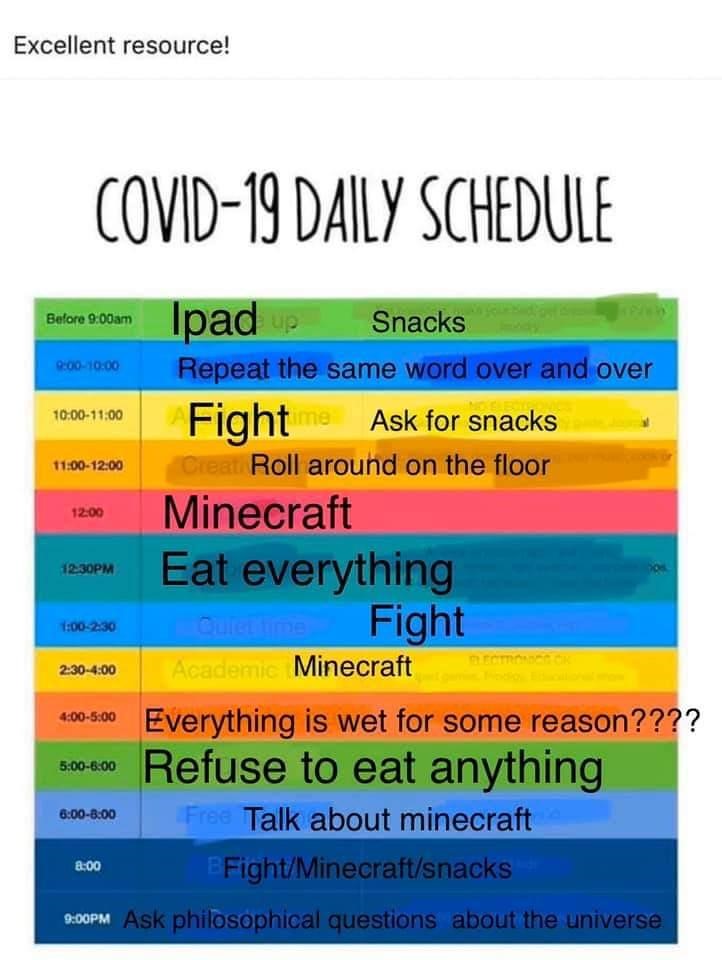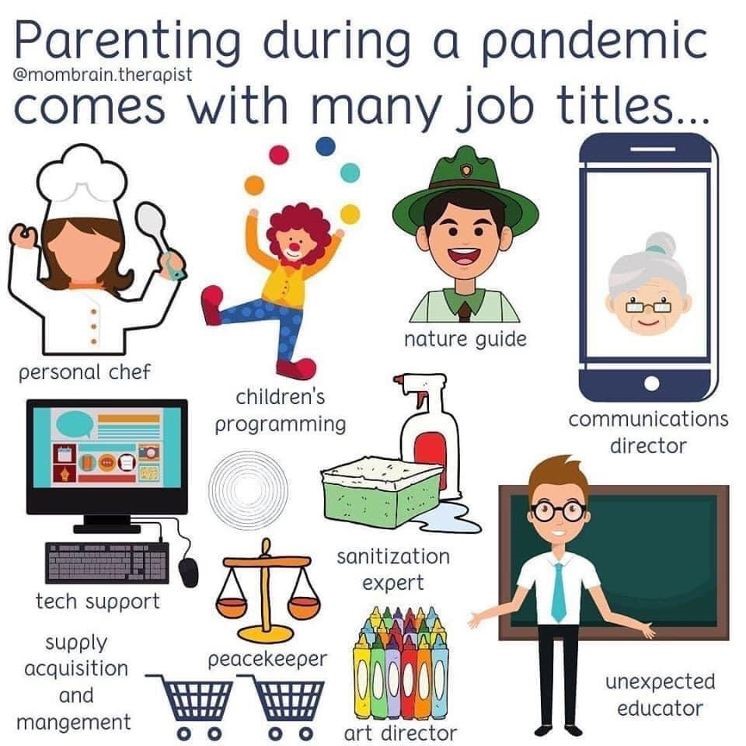Our lives are arranged around natural and artificial rhythms. The original rhythms are celestial-sunrise/sunset, cycles of the moon, menstruation, seasons of the year. Artificial rhythms include wake/sleep times, eating meals, hunting for and gathering food. Society creates rhythms that include clockwork time, school, work, personal grooming and weekday/weekend. Rhythms in specific contexts include changing classes, team meetings, project due dates, ebb and flow of customers, etc. These rhythms shape our days and help us be productive. They are something we don’t often think about until a pandemic completely upends every single aspect of our life and throws us and our children together 24/7!
In many (if not all) areas of life during this shut down, these artificial rhythms are all screwed up. This disruption of rhythms creates extreme stress on us and humans don’t like chaos. We are predictors. Our brains work non-stop to anticipate the future. When we can’t confidently predict what is going to happen it makes us very anxious because then something bad could happen. This is particularly true for children.
You and your kids are extremely stressed right now. Routines will help with that.
Routines
Routines are an important part of feeling safe and comfortable. A schedule is the clearest and most direct expression of your child’s routines. Everything important that is required during the day should be on their schedule. In this way, they know what they are going to do now (and to know when they WON’T be doing things.)
It may be helpful to divvy up your life in time blocks of “hygiene.” Not only emergency hygiene (handwashing, physical distance and hand sanitizer/masks), but also
- sleep hygiene (try to be off phones and screens 2 hours before bedtime to not interrupt REM sleep),
- brain hygiene (reading productive material that allows for some sort of vacation from the corona virus— away from the news),
- social hygiene (lots of zoom calls and facetiming friends and family),
- screen hygiene (slow, calm, prosocial screen time is best for young children and educational programming like Mister Rogers Neighborhood),
- emotional hygiene (journaling, taking walks, logging into 12 step meetings online are free and helpful).
Scheduling Basics
Having a schedule doesn’t mean every minute has to be accounted for but it does mean that big blocks of time will recur regularly. Some of the blocks will be daily, some will be multiple times a week and others will be weekly. With all the craziness and unstructured time your children have been spending while we all waited to find out what was going to happen, your kids have naturally created their own routines as well as driving you crazy to get your help, time or attention. No doubt, it is looking something like this schedule. To get this turned around, you will need to identify what you expect your child’s day to look like. Here are some of the categories.

Sleep/wake. Establishing a set sleep and wake time is a basic component of keeping your child mentally organized, physically rested and you from losing your mind. Children need 10-14 hours of sleep every night, depending on their age. Set it and insist on it, even if you spend 2 hours getting them to stay in the bed. After a week (maybe 2) they will stop fighting you. Don’t forget about the importance of a bedtime routine that creates a gradual transition to sleep.
Meals. Have meals at regularly scheduled times. Clearly identify what snacks are available and when they can have them. It may be helpful to have an opening and closing time for the kitchen with fruit available in between meals. This will keep your family in a routine that can be calming to children and provides them with a feeling of stability. Meals together utilizing “Rose, Bud, Thorn” can be helpful for incorporating connecting conversations. Rose is something that went well today, Bud is something you hope for, Thorn is something that is really bothering you today).
Academics/Learning Activities. It is important for your child to continue to acquire new learning and academic skills. There is a well known concept in education known at summer learning loss. Across the summer break, children can lose as much as a 30% of their learning from the academic year, especially in math. In some ways summer break just started 2 months early!
Your kids need to be engaged in some activities and tasks that clearly build and expand on academic skills in reading, math, science and social studies. They can benefit from art, music and foreign language education (or training). (As a parent, you will want to keep Commonsense Media on your saved sites. This is a consistently amazing site for helping you make decisions about movies, video games and media. While writing this column we also discovered that they have an amazing educational resources section too!)
Don’t forget, as a parent, you are the primary teachers in your child’s life. You can join them in some of these unfamiliar (or long unused) skills. Just don’t forget that children don’t typically listen, they watch. The resources above will provide a solid base for you to get some “larnin” into your child’s day.
Physical activity. Your kid must engage in physical activity until they are exhausted every day (for your sake if nothing else though it has the side benefit of being really good for them.) Consider walks/hikes, going on runs and family recess time. Flying things can be fun like discs (what we used to call Frisbees) and kites. Old fashioned games like 4 square, kickball and hopscotch are fun and they also teach your kids the potential value of simple, non-electronic, fun activities. And, of course, playing any of the organized sports your child has already been participating in but as a family. Finally, find a place you can set your child loose. The single most productive play is free play. Free play is unstructured and without prior rules or predefined expectations. It is totally constructed by the child. This provides not only exercise and active movement but it also encourages creativity, problem solving, problem finding, frustration tolerance, discovery of previously unrecognized interests and how to find something mentally challenging when you are bored. Look for an isolated area of nature and make a morning or afternoon of it (i.e., picnic like). Sticks, rocks, dirt, water, leaves and flowers have no built in “uses” and so can be made to be anything (In addition to being examined and enjoyed for their own sake). (Jim’s book has a chapter on the importance of play and how to foster this important experience in children.)
Quiet Time. Having a set quiet time each day for reading and resting is helpful. It helps children learn how to settle themselves down when they may not want to. It also creates a recharge for the rest of the day. Scheduling this after lunch can match the body’s shift in energy to digest food.
Screens. The glory and horror of our modern age. There will be a future column that details important considerations about kids and their use of screens. And, Stacy has a whole book about it. The short version is set some limits and make sure the time they spend is less than any other activity. As you monitor your child’s screen time, you may also discover that your own focus on screens has taken on a life of it’s own. How to break up with your phone by Catherine Price is a valuable resource for parents who are caught between wanting to offer quality parenting to their children and “split attention” always having a phone in their hand.
Social Media. This will be another future column. There is no value of children having access to social media that is significant enough to counteract the vast range of problems caused by it. Wait Until 8th.
Family Time. Your kids need time with you to learn the things that only you can teach: values and morals, perspective, their own personal worth and how to live a meaningful life. Discussing the importance of a time to rest, a time to innovate, a time to pivot, a time to reflect, a time to assess, a time to communicate, a time to resolve conflict, a time to assess your true values, a time to re-prioritize, a time to lay down on the grass, look up at the sky and tell yourself it’s going to be okay. (See Rest below)
Life of the mind/Culture. One of the most significant predictors of successful and happy people is being a life long learner. This is the intellectual equivalent of free play. Learning not because it is required to pass a course but because it results in personal growth and development. Make sure there is a time set aside for book reading, informational video watching or art viewing. Poetry prompts can be an interesting activity that stretches everyone’s mind in a creative and fun way. Making regular entries in a journal has remarkable benefits both in processing things that are happening in your life as well as improving your mental health. (Go figure?)
Free Time. Your child will also need to have the opportunity to use their time however they want, within reason. Many children can discover art, music, simple instruments like ukelele or the melody harp during this extended “quiet time”
Weekday/Weekend. Finally, there is value in separating out the week day from the weekend. This is a structured way to orient your child (and yourselves, as you have no doubt discovered: “What DAY is it?!) to time passing, things accomplished across the week and to think ahead about what is worth accomplishing in the upcoming week. It also clarifies that most days are for doing constructive things while only a couple of days are for doing other things.
Making the schedule
You could also simply block off time across the day with colored markers on an old fashioned calendar; for example 8am-12pm academics, 12-1 lunch and clean up, 1-2:30 rest time and reading, 2:30-5:30pm extra activities. Fancy algorithms and elaborate charts aren’t required. There are also some schedules you can adapt for your own use. Here are a couple of example schedules that have been created specifically to address the unique nature of this shut down. It is like we are living a combination of school break and homeschooling. With that in mind, homeschooling families have lots of experience scheduling their child’s day. You can find some examples here and here and here. You can also easily adapt daily summer or school break schedules for these strange days. Whatever the form it takes make it specific and stick to it!
Beginnings are rough. Your child will push back against establishing a routine. Put all your energy upfront enforcing the schedule. After about a week, most children will begin to settle into it. Do everything you can to keep your cool. These are extraordinary times and the disruption in their routines and schedules as well as the family and societal stress has been taking a huge toll on your child. Just keep redirecting them. Initially you may need to be right beside them as they do their own activities. As they settle into the routine, you will be able to leave them to it and accomplish things you need to take care of.

Don’t overdo it. This is too much. Seriously. Don’t buy into this infographic. You can’t do everything. I know people keep telling you can but you can’t. You are not a teacher. You are not a recreational therapist. You are terrible at coming up with amazingly creative games that simultaneously entertain your children and teach them vital lessons about life. You have a job (or need to be figuring out how to get one). Remember after your first child was born? Remember parenting by the seat of your pants? This is like maternity leave. For 6-12 weeks you will be focusing on taking care of the baby; a big, loud, clingy, walking, trouble making, demanding baby who expects you to entertain them every minute. You must have some time for yourself (if all of you are going to get through this as an intact family). Your kids need to learn to occupy themselves. Your kids need to respect times when you are not available to them except in an emergency. We will have some suggestions about self-care in a future column.
So what is enough? Pick the major categories you think are important (these should at least include sleep/wake schedule, meals, physical activity, quiet time and free time). You should limit screen time despite how well it keeps the precious angels mesmerized because it creates all kinds of trouble when they aren’t on the screens. (See Stacy’s book The 30 Day Blackout for reasons why). So that means you will need to have some kinds of constructive activities. Look for the sweet spot where you are not exhausted by doing too much but your child has been adequately exercised and engaged in productive activities. (And, you determine what is “adequate.”)
Be flexible
Things will continue to change so you will have to adapt or . . . be overwhelmed. There are some blocks on the schedule that will not change. You will decide what they are. On the other hand, blocks and activities can be added or removed or changed. You get to decide. Your child may be especially tired one day. YOU may be especially tired one day.
Rest
And finally, pay attention to getting adequate rest. What many of us have not encountered or incorporated into our lives is REST. Most of us have not prioritized rest, and now we are learning to rest, to pause, to take a break for an indefinite period of time requiring a skill few of us practiced well to begin with. You will really need this now. Meditation is an extremely beneficial practice to find rest in mind, body and spirit. It is short, doable, helpful and calms the nervous system in a season of life where none of us are in a place of power, but powerlessness. There are many different forms of meditation. There are apps that can help. Rest is important for making it through these difficult days.

